简体中文
繁體中文
English
Pусский
日本語
ภาษาไทย
Tiếng Việt
Bahasa Indonesia
Español
हिन्दी
Filippiiniläinen
Français
Deutsch
Português
Türkçe
한국어
العربية
Marketmind: A month of war
Abstract:Its a month since Russian troops stormed into Ukraine, goading the West into an unexpectedly severe sanctions response. Now, a new twist — President Vladimir Putin wants “unfriendly” nations to pay for energy imports in roubles, not euros or dollars.

A look at the day ahead in markets from Sujata Rao
A look at the day ahead in markets from Sujata Rao
And contracts must be switched in a week, Putin has demanded.
The demand carries all kinds of ramifications and its unclear if Western firms, wary of trading Russian assets, will agree. But the announcement promptly sent European gas prices higher. And meanwhile, a Kazakh oil pipeline outage has lifted Brent crude back above $120 a barrel.
It all heaps on the price pressures — JPMorgans latest estimate is for global inflation to hit 6.3% this quarter, the fastest increase in a quarter of a century. And more aggressive central banks — even habitually dovish U.S. policymakers now seem willing to endorse bigger interest rate rises in May.
And of course recession fears are on the rise, as U.S. bond yield curves are signalling.
Graphic: U.S. bond yield curve: https://fingfx.thomsonreuters.com/gfx/mkt/gdpzyjykjvw/US2203.PNG
We will get an idea of the kind of hit to business activity and sentiment are taking from the war as advance readings of March Purchasing Managers Indexes (PMIs) trickle out.
Japanese PMIs show business optimism has notably softened but Europe may fare worse; Wednesday data showed consumer confidence plunging in March to May 2020 lows.
All that and more will be debated at a summit of NATO and European leaders in Brussels, which U.S. President Joe Biden will join. Expect more sanctions against Russia.
Finally, equity trading has resumed in Moscow after a 3-1/2-week shutdown, albeit on a limited basis. And currency traders are awaiting clarity of whether European buyers can swing rouble payments for gas — that possibility lifted the Russian currency 8% on Wednesday.
Graphic: Who buys Russia‘s oil and gas? Who buys Russia’s oil and gas?: https://graphics.reuters.com/GLOBAL-OIL/RUSSIA/myvmnxxolpr/chart.png
Key developments that should provide more direction to markets on Thursday:
-ECB board member Frank Elderson speaks
-Fed speakers: Chicago President Charles Evans, Minneapolis Fed‘s Neel Kashkari, Governor Christopher Waller, Atlanta Fed’s Rafael Bostic
-Switzerland to resist global rate-hike trend
-Norway to raise rates by 25 bps
-U.S. weekly jobless claims/final core PCE/durable goods
-U.S. 10-year TIPS auction
– Mexico to raise rates by 50 bps, South Africa to deliver 25 bps rise

Disclaimer:
The views in this article only represent the author's personal views, and do not constitute investment advice on this platform. This platform does not guarantee the accuracy, completeness and timeliness of the information in the article, and will not be liable for any loss caused by the use of or reliance on the information in the article.
Read more

INFINOX Partners with Acelerador Racing for Porsche Cup Brazil 2025
INFINOX has teamed up with Acelerador Racing, sponsoring an Acelerador Racing car in the Porsche Cup Brazil 2025. This partnership shows INFINOX’s strong support for motorsports, adding to its current sponsorship of the BWT Alpine F1 Team.

The Daily Habits of a Profitable Trader
Every professional trader follows a structured approach to ensure they are well-prepared, disciplined, and able to seize opportunities with confidence. Whether you are a seasoned investor or an aspiring trader, adhering to a robust daily checklist can significantly enhance your performance. Use this checklist to check if you are a qualified trader

The Impact of Interest Rate Decisions on the Forex Market
Interest rate changes determine currency attractiveness, influencing capital flows and exchange rate trends. Understanding this mechanism helps investors navigate the forex market effectively.

How a Housewife Lost RM288,235 in a Facebook Investment Scam
A 47-year-old housewife in Malaysia recently fell victim to an online investment scam, losing a substantial sum of RM288,235 after engaging with a fraudulent scheme advertised on Facebook.
WikiFX Broker
Latest News
Interactive Brokers Launches Forecast Contracts in Canada for Market Predictions
Authorities Alert: MAS Impersonation Scam Hits Singapore
INFINOX Partners with Acelerador Racing for Porsche Cup Brazil 2025
The Impact of Interest Rate Decisions on the Forex Market
Billboard Warns of Crypto Scams Using Its Name – Stay Alert!
STARTRADER Spreads Kindness Through Ramadan Campaign
Rising WhatsApp Scams Highlight Need for Stronger User Protections
A Trader’s Worst Mistake: Overlooking Broker Reviews Could Cost You Everything
How a Housewife Lost RM288,235 in a Facebook Investment Scam
The Daily Habits of a Profitable Trader
Currency Calculator







